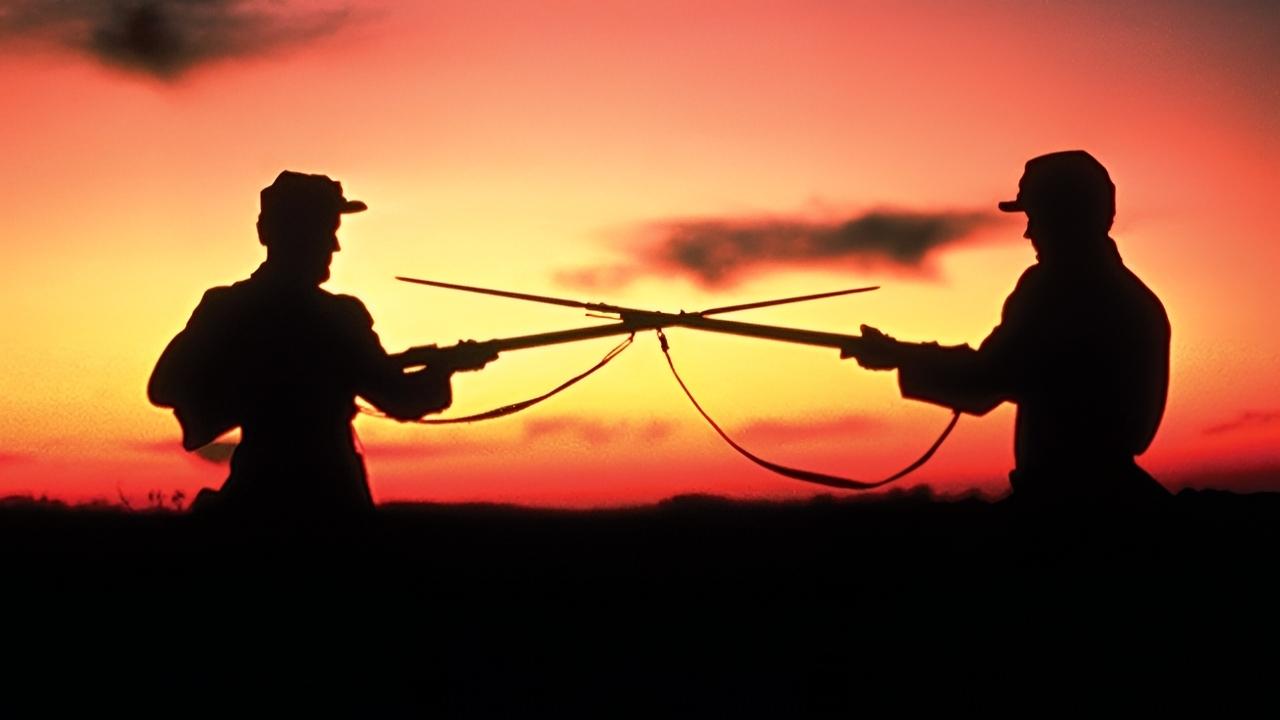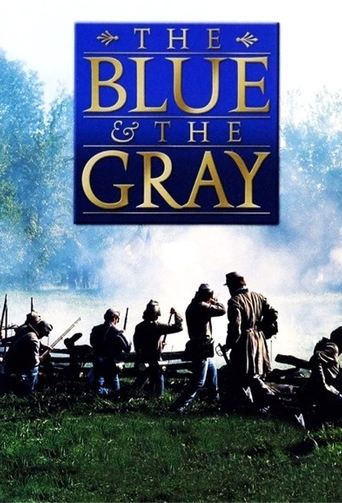

America's existence, as a beacon for freedom and democracy around the world, has often seemed to be (and frequently is, in reality) a work in progress. Nowhere is that better illustrated in the event that is oftentimes known as the War Between The States (North and South), but generally known as the Civil War. A bitter war fought largely over the question of whether it was right to keep anyone, especially those of African descent, as slaves, the war almost eviscerated the country during four long bloody year, from 1861 to 1865. It was only when the 13th Amendment and the Emancipation Proclamation became law that the war ended, as too did slavery, and the long march toward full civil rights had really begun. This was the subject for the epic 3-part miniseries THE BLUE AND THE GRAY, which aired on CBS on November 14, 16, and 17, 1982.The principal focus is on two families: the Geysers, a farm family from Charlottesville, Virginia who have no prurient interest in the issue of slavery that is essentially fueling the war but are sympathetic to the South; and the Hales, who are owners of a small newspaper in Gettysburg, Pennsylvania and anti-slavery/pro-Union. They become a microcosm of this long, costly, bloody war that nearly destroyed America before it could even reach its 90th year of existence as a country; and even in the Geyser family, there is a schism. Both families, though, do reunite after the end of the war, but not before the war more or less claims its last victim in President Abraham Lincoln, when John Wilkes Booth guns him down at Ford's Theatre.In the meantime, the Civil War is re-enacted, under the bounds of what could be shown on television, with a fair amount of pain and horror without an over-reliance of melodrama, but with solid acting by a huge cast of great people, including Stacy Keach; Colleen Dewhurst; Lloyd Bridges; Warren Oates (in one of his last roles, as Major Welles); Sterling Hayden (as John Brown); Rip Torn (as General Ulysses S. Grant); Robert Vaughn; Paul Winfield; Julius Harris; Diane Baker; Rory Calhoun; and, last but not least, Gregory Peck, in his first-ever dramatic TV appearance, as Lincoln. All of this is brilliantly bought together by veteran director Andrew V. McLaglen, who had done the Civil War in fictional form prior to this, in the form of 1969's THE UNDEFEATED (with John Wayne), and 1965's SHENANDOAH (with James Stewart).Even in the restrictive confines of TV, and even when compared to later films on the subject like GETTYSBURG and LINCOLN, THE BLUE AND THE GRAY does very little skimping over what war in general, and this singular war in particular, does to people not only on both sides of the battle lines but also to those innocents caught in the middle. And despite its extreme length, of close to six and a half hours, this is still one of the best miniseries ever produced in TV history. It should be watched by anyone serious in understanding our nation's history in general, and the Civil War in particular, and is essential just for anyone still interested in historically based storytelling, small screen or otherwise.
... View MoreEvery cliché' in the book is used. And, worse, far more than once. If you can't guess what's going to happen in a particular scene then you haven't watched many if any movies. A far better soap opera on the Civil War is "North and South". You will find far better acting as well as a better and more believable story line. What's really a shame is that there is some very good talent in the mini series that is completely wasted. Even the scene when the Gettysburg Address is given is vastly overblown and forced. That scene is indicative of the series taken as a whole. Instead of being understated as the original speech was, it and the series take on the tone of Edward Everett, the speaker who was just before Lincoln. Edward Everett's saving grace is that his speech was only some 2 1/2 hours long. The mini-series is 7 1/2 hours in length, though it seems much, much longer. Lincoln's famous 300 words than didn't even take 3 minutes to recite.
... View MoreI did not see this movie when it was shown as a mini-series.I happened to like this movie because it gave a simple portrayal of what it might have been like to be a family during this period and having to face the problem of a family that was divided in its loyalties . I thought the makers of this movie followed the history of the period and gave a good presentation of the issues that the people had to deal with at the time. Of course it cannot compare to the recent Civil War Movies or even the Ken Burns series . Given the time that it was made I think it was a good portrayal of the period.My only fault with the movie was the fact that it seemed to put the fall of Vicksburg after the Gettysburg Address. I did not understand how this was allowed to happen given the fact that it seemed to be based on Bruce Catton's work. Can anyone explain this?
... View MoreI first saw this mini-series while in 5th grade history class as part of our studies on the Civil War, and I thought it was excellent. Many years later, I watched it again after finding a copy of the unabridged version (all 6+ hours of it!). I wasn't sure how it would stand the test of time (both as a 16 year old production and my own view of it, being 16 years older now) and braced myself for disappointment; however, I was very pleasantly surprised. The movie is as well done as I remembered it.It's an engrossing movie that gives an honest, frank look at the inherent moral ambiguity of war, as well as the additional consequences of the Civil War, where "brother fought brother". Although the movie certainly takes dramatic license (the main character, a young Southerner who relocates to the north after becoming disillusioned with the cruel treatment of slaves, ends up stumbling across his staunchly pro-Confederate siblings as if they're all wandering around in the same town instead of an entire country!), you can see that the film makers took great pains to portray as many perspectives as possible, to show that each and every person involved in the war was human, with their own thoughts and feelings. I'm certainly no Civil War expert, but I thought it was a very balanced portrait. What's more amazing is that the mini rarely drags despite sometimes taking a leisurely pace during its 6 hour run-time. Although we all know how the movie with ultimately end, it keeps you interested in the lives of all the characters it introduces. I thought Stacy Keach did a particularly good job despite a few hammy lines. This mini-series should definitely be on any must-see list of war films.
... View More